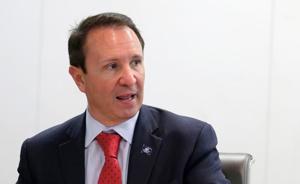
Attorney General Jeff Landry, a leading candidate for Louisiana governor, criticized journalists and what he described as rising “sexualization of children” as he stumped at the State Capitol Tuesday for a bill that would tighten access to library materials with sexual themes.
Sponsored by state Sen. Heather Cloud, R-Turkey Creek, Senate Bill 7 calls on libraries to create card systems that would let parents select cards allowing children to check out sexually explicit materials, among other guardrails. Children whose parents do not sign off on the cards would not be able to access those materials — something Cloud calls a common-sense step for libraries to shield children from inappropriate content.
The education committee approved the bill on an 8-3 vote, sending it to the full House — the final hurdle before the bill heads to Gov. John Bel Edwards’ desk.
“Our goal is to empower parents with knowledge and to encourage them to decide for themselves, ‘Is this sexually explicit material appropriate for their children?’” Landry told committee members. “The media has done such a great job of saying everything that this bill, and the things that we’re doing, are not.”
However, several librarians told the House Education Committee that their workplaces are nothing like Landry and Cloud described, and that SB 7 could end up hampering their jobs.
“I have had words like ‘groomer’ and ‘pedophile’ thrown at me,” said Amanda Jones, a school librarian in Livingston Parish. “I went from being a community leader to an outcast because I am a librarian.”
The legislation is one of several efforts this session to target content dealing with gender and sexuality in schools and libraries; various Republican-controlled state legislatures nationwide have advanced similar measures. Supporters say the bills are efforts to preserve parents’ choice and religious freedom, while critics say they disproportionately target LGBTQ+ children and materials and hearken back to dangerous past censorship movements.
Cloud’s bill does not propose banning, censoring or removing any material from libraries, she has pointed out. However, people who supported the bill in the Senate Education Committee last month specifically cited books that contain LGBTQ+ content — “The Gay BCs,” “My Princess Boy,” and “Gender Queer,” each of which have drawn the ire of conservatives seeking to advance library-related restrictions elsewhere in the country.
Content about LGBTQ+ people has become the target of a wave of school book challenges nationally; but a large percentage of complaints about that content has come from a minuscule number of active complainants, according to an investigation published Tuesday by the Washington Post.
In the committee hearing Tuesday, Landry challenged newspapers to publish images featured in some of the books that he described as sexually profane, accusing them of downplaying the problem and saying the content is so graphic that it would not be appropriate for their pages.
The Attorney General’s Office has investigated a growing number of child-abuse complaints in recent months, Landry told the panel, arguing without evidence that access to sexual material in libraries has contributed to that problem.
Landry, a supporter of former president Donald Trump who often wades into national legal fights, is emerging as a frontrunner in the governor’s race in terms of fundraising and polling figures.
Besides the library measure, which echoes an earlier effort by Landry’s office to have people report lewd content, Landry is backing a controversial effort to reveal youth criminal records in three majority-Black parishes, an attempt to make the criminal justice system more transparent, supporters say. Critics have lambasted it as racist.
Some bills that would curtail talk of gender and sexuality in schools or libraries have sailed through the House with greater ease than in past years, though the true test for such legislation generally comes in the more-moderate Senate. Cloud’s bill had already earned approval from the upper chamber.
Several conservative activists including Slidell pastor John Raymond, a member of the Republican State Central Committee who faces child-abuse charges for allegedly taping shut the mouths of three students and beating another at the Christian school he oversaw, said the bill would protect children from content harmful to their development.
But librarians and LGBTQ+ activists said the effort contradicts with conservatives’ professed interest in preserving the rights of parents.
“I’m concerned this bill will hamstring parents’ rights to determine what is appropriate for their children by handing control over the definition of what is and is not appropriate to the state and library boards of control,” Kimberlee Reynolds, a librarian in Jefferson Parish, told the panel.
Voting yes on SB 7:
Rep. Lance Harris, R-Alexandria
Rep. Beryl Amedée, R-Houma
Rep. Julie Emerson, R-Carencro
Rep. Barbara Freiberg, R-Baton Rouge
Rep. Brett Geymann, R-Lake Charles
Rep. Charles Owen, R-Rosepine
Rep. Vinny St. Blanc, R-Franklin
Rep. Phillip Tarver, R-Lake Charles
Voting no on SB 7:
Rep. Ken Brass, D-Vacherie
Rep. Tammy Phelps, D-Shreveport
Rep. Patrick Jefferson, D-Homer


Leave a Reply